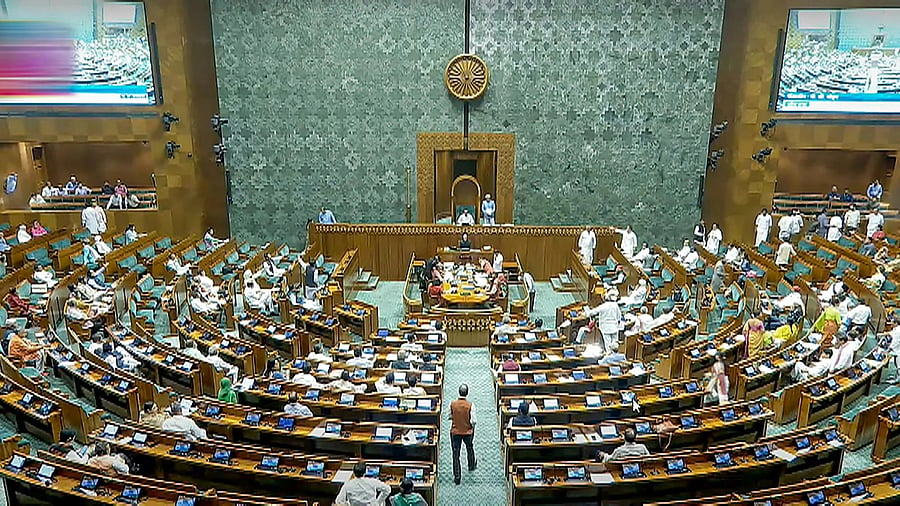
Members in the Lok Sabha in the Parliament, in New Delhi. (For representational purposes)
Credit: PTI File Photo
New Delhi: The Narendra Modi government’s plans to introduce a Bill that could change the character of Chandigarh administration during the Winter Session of Parliament have triggered a controversy with AAP, Congress and Akali Dal warning the ruling dispensation against any “attempt to snatch” Punjab’s rights over the city.
While the content of the Bill is not public yet, there is apprehension in Punjab that it may dilute its hold over the union territory where its Governor doubles up as the Administrator since 1984.
Demand for control over Chandigarh is a contentious issue with Haryana too making a claim over it during bifurcation in 1966, prompting the government to designate the city designed by Le Corbusier as capital to both the states but keeping it a union territory.
The argument by the opponents of The Constitution (131st Amendment) Bill 2025 is that if the existing arrangement is diluted, Punjab would lose its claim over making Chandigarh its capital exclusively.
Along with this Bill, the Modi government is also planning to bring nine other new Bills seeking to open up the nuclear sector to private players, introduce reforms in higher education as well as those linked to reforms in the insurance sector, securities and easing land acquisition for highways among others.
The government also intends to pass the Jan Vishwas (Amendment of Provisions) Bill 2025 and the Insolvency and Bankruptcy Code (Amendment) Bill 2025, which are being examined by Joint Committees of Parliament, Parliament Bulletins have said.
However, the Chandigarh Bill, seeking to include Chandigarh in Article 240 of the Constitution and align its administration with that of other union territories without legislatures -- Andaman and Nicobar, Lakshadweep, Dadra and Nagar Haveli and Daman and Diu -- as well as Puducherry when its Assembly is dissolved or suspended, has triggered strong reaction in Punjab.
Punjab Chief Minister Bhagwant Mann opposed the Bill in "strongest terms", saying it is against the "interests" of the state and they will "not allow the conspiracy being hatched" by the Union government to succeed in any way.
"Chandigarh, built by razing our Punjab's villages, belongs solely to Punjab. We will not let our right slip away just like that. For this, we will take whatever steps are necessary," he said, adding the AAP will oppose it in Parliament.
Punjab Congress president Amarinder Singh Raja Warring said any attempt to "snatch" Chandigarh from Punjab will be resisted. "Chandigarh belongs to Punjab and any attempt to snatch it away will have serious repercussions," he said.
Akali Dal also came out against the proposed Bill, saying it is “against the interest of Punjab” and would amount to the Centre going back on its commitments made to Punjab regarding the transfer of Chandigarh to the state. It said it will “never accept” and would “oppose” this move “tooth and nail”.
Party chief Sukhbhir Singh Badal said the previous Congress governments in Delhi have discriminated against Punjab and deprived them of their capital city.
“This Bill further seeks to remove whatever little administrative and political control Punjab has over Chandigarh and would permanently extinguish Punjab’s claim to Chandigarh as its capital city. This Bill constitutes a direct assault on Punjab’s rights and violates the basic principles of federalism,” he said.
Another major Bill listed for this session, which starts on December 1 and ends on December 19, is The Atomic Energy Bill 2025 that seeks to "govern the use and regulation" of atomic energy in the country. Details of the Bill are not yet in public domain but it is expected to provide provisions for opening up the nuclear power generation to the private sector.
Also high on agenda is The Higher Education Commission of India Bill 2025 that aims to set up a Commission to facilitate the universities and other higher educational institutions to become independent self-governing institutions and to promote "excellence through a robust and transparent system of accreditation and autonomy".
To ensure faster and transparent land acquisition for National Highways, the government intends to amend the existing National Highways Act while certain amendments are being made to the Companies Act 2013 and LLP Act 2008 through The Corporate Laws (Amendment) Bill 2025 to facilitate Ease of Doing Business and remove gaps identified in the report of the Company Law Committee 2022.
To frame a single law to deal with the securities market, the government intends to consolidate the provisions of the SEBI Act 1992, Depositories Act 1996 and Securities Contracts (Regulation) Act 1956 into a rationalised single Securities Markets Code.
To deepen penetration, accelerate growth and development of the insurance sector and enhance ease of doing business, The Insurance Laws (Amendment) Bill is being planned. The Arbitration and Conciliation (Amendment) Bill 2025 is another Bill on agenda.
